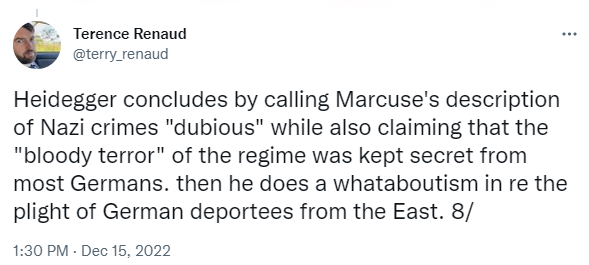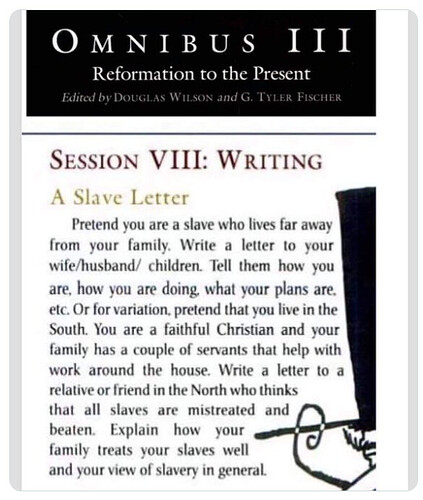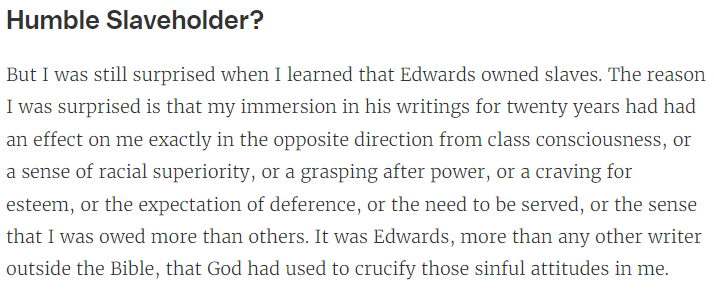I didn’t want to hijack the conversation in Pithy quotes from our current reading which give us pause to reflect, but Jonathan Edwards was a slave owner, and I ran across a Twitter thread today concerning Heidegger’s failure to disavow Nazism. Can we separate the man from his philosophy/theology?
https://twitter.com/terry_renaud/status/1603487684567400448
Herbert Marcuse visited his ex-teacher Martin Heidegger in his Black Forest hut in 1947. here’s what HM wrote to MH (8/28/47):
“Many of us have long awaited a statement from you, a statement that would clearly and finally free you from…identification [with the Nazi regime]” 1/
Marcuse: “But you have never uttered such a statement… I—and very many others—have admired you as a philosopher; from you we have learned an infinite amount. But we cannot make the separation between Heidegger the philosopher and Heidegger the man…” 2/
"A philosopher can be deceived regarding political matters… But he cannot be deceived about a regime that has killed millions of Jews—merely because they were Jews—…and that turned everything that pertains to the ideas of spirit, freedom and truth into its bloody opposite."3/
Marcuse: “Is this really the way you would like to be remembered in the history of ideas?.. Common sense (also among intellectuals)…refuses to view you as a philosopher, because philosophy and Nazism are irreconcilable. In this conviction common sense is justified.” 4/
Marcuse ends the letter by repeating his demand that Heidegger issue a public disavowal of his Nazi past, but also says that he’s still sending his former teacher a CARE package against the advice of friends. 5/
here’s how Heidegger responds:
Heidegger (1/20/48): “[In 1933] I expected from National Socialism a spiritual renewal of life in its entirety, a reconciliation of social antagonisms and a deliverance of western Dasein from the dangers of communism…In 1934 I recognized my political error and resigned…” 6/
Heidegger claims that his and his family’s lives would’ve been in danger had he issued a public statement in 1934. as for after 1945, he says “the Nazi supporters announced their change of allegiance in the most loathsome way; I, however, had nothing in common with them.” 7/
Heidegger concludes by calling Marcuse’s description of Nazi crimes “dubious” while also claiming that the “bloody terror” of the regime was kept secret from most Germans. then he does a whataboutism in re the plight of German deportees from the East. 8/
Marcuse’s final reply (5/12/48):
“This is not a political but instead an intellectual problem—I am tempted to say: a problem of cognition, of truth. You, the philosopher, have confused the liquidation of occidental Dasein with its renewal?” 9/
Marcuse on MH’s comparison of Nazi extermination of Jews to Allied deportation of Germans from East: “With this sentence don’t you stand outside of the dimension in which a conversation between men is even possible—outside of Logos?” 10/
Marcuse: “For only outside of the dimension of logic is it possible to explain, to relativize, to ‘comprehend’ a crime by saying that others would have done the same thing.” he then states the obvious fact that German deportees suffered nothing like the murdered Jews. 11/
Marcuse: “the Nazi system… demonstrated to the world what, after more than 2000 years of western Dasein, men can do to their fellow men… Perhaps we are still experiencing the continuation of what began in 1933. Whether you would still consider it a ‘renewal’ I am not sure.”//


